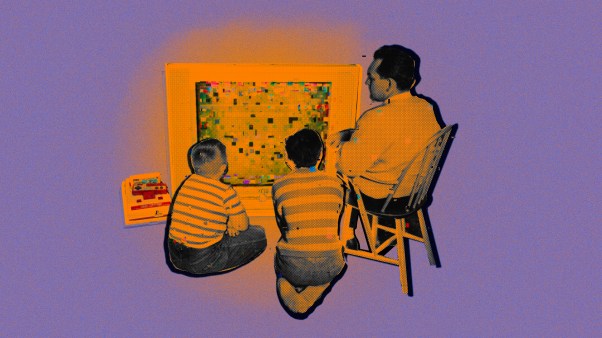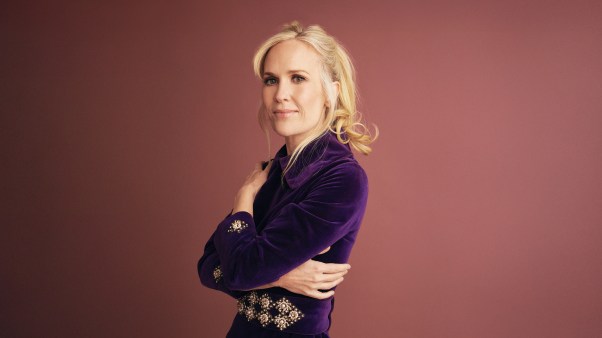Not only creeping republicanism but also creeping secularism is developing in Canada as traditional Christian symbols are dropped from government along with traditional royal ones. The new national flag with a maple leaf as its main symbol has replaced the flag in whose top left corner appeared a Union Jack with its three crosses of St. George, St. Andrew, and St. Patrick. Now parliament has made “O Canada” the national anthem, replacing “God Save the Queen.”
What the exact words of the new national anthem will be is still unknown. A parliamentary committee is working on a revision of a version that has been sung popularly but unofficially for two generations. The desire for revision is due in part to a dislike of the song’s several repetitions of the words, “We stand on guard for thee”:
O Canada, our home and native land,
True patriot love in all thy sons command.
With glowing hearts, we see thee rise,
The True North, strong and free,
And stand on guard, O Canada,
We stand on guard for thee.
O Canada, glorious and free,
We stand on guard, we stand on guard for thee.
O Canada, we stand on guard for thee.
But a more important reason for revision is the present version’s failure to recognize the sovereignty of God in the clear and majestic way “God Save the Queen” did.
If a national anthem is to express the national character truly, and if Canada has not become a secularistic country, it is imperative that its anthem call on citizens to acknowledge their recognition of God as the ultimate ruler of the land.
Certainly the origins of Canadians’ life show this recognition of God as ruler. When in the sixteenth century Jacques Cartier landed on the shores of the Gaspe peninsula to claim the territory for the king of France, he planted a great cross to show that he came not only as a Frenchman but also as a Christian. And when the early British explorer Martin Frobisher came to Canada’s northern shores, the first act of his crew was a communion service conducted by their chaplain, Master Wolfall.
Confederation in 1867 showed the same conviction: both the title, “Dominion,” and the national motto, “From Sea to Sea,” were taken from Psalm 72.
Unless Canadians have now reached a point where the majority recognize no power above the temporal one, their national symbols must manifest this traditional conviction that God is “king of kings, lord of lords, the only ruler of princes.”
Believers in God should not allow themselves to think that this is a trivial matter because “what’s in a name?”—or a flag, or an anthem. The recognition of God’s sovereignty by a nation is one of the most fundamental principles in its political philosophy, and a failure to see that can be the first step toward a totalitarian state.
The late H. Richard Niebuhr contended that belief in God was the basic reason for the establishment in the American constitution of the system of checks and balances that prevents any one branch of government from arrogating undue powers. Some have said that this feature resulted from a theological tradition that stressed original sin and hence did not want to trust any human institution more than was necessary. But Niebuhr argued that the Christian belief in divine sovereignty was the really decisive influence, conscious or unconscious, in the thinking of the framers of the constitution.
Niebuhr’s thesis is cogent, because a belief in original sin is not enough to ensure democracy. Thomas Hobbes, for example, showed in the previous century that a strong awareness of human corruptibility could lead a person to advocate an absolute government as an effective policeman for keeping depraved man in check. Niebuhr was right. Only when people are clearly convinced that above them stands the Almighty God is there a sure way of guarding against inordinate pretensions by governments.
In speaking of “the mandate of heaven,” Walter Lippmann has expressed somewhat the same idea. Democracy, he says, requires belief in a higher sovereignty than the state’s. Historically, human rights have needed the recognition that above the government stands some higher power, such as a personal and sovereign God, or a higher law, such as the natural order. The loss of both convictions by large numbers in the nineteenth century, Lippmann says, prepared the way for the twentieth century’s acquiescence to the total claims of the state.
Christians and others should therefore take seriously the threat posed by the creeping secularism in such traditionally theistic countries as Canada and the United States. What may seem to some as quibbling over words is really a matter of great significance. A romantic idealization of secularity should not be allowed to bring about a naïve submission to what is a danger both to faith and to freedom.










